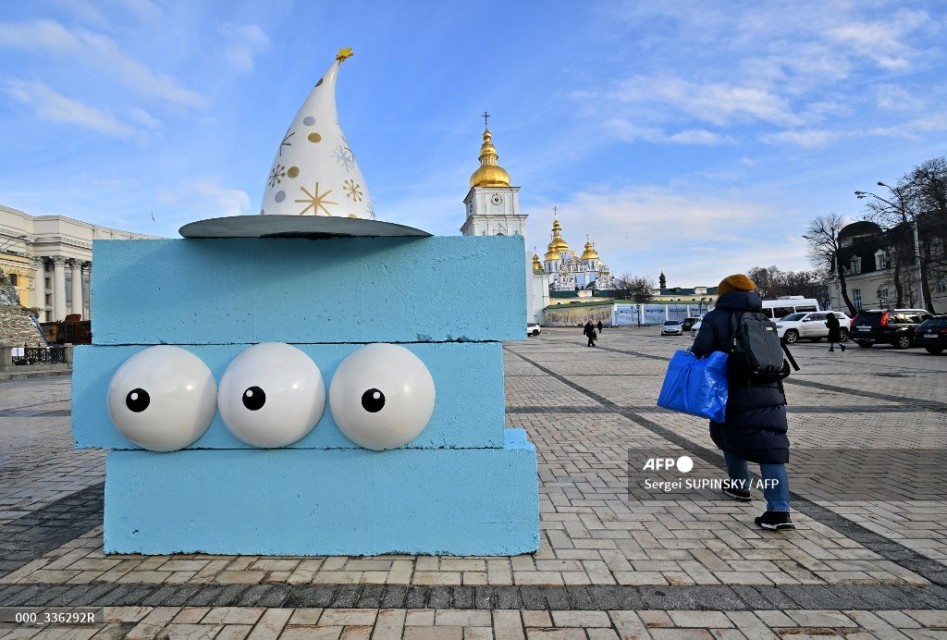

Russians are used to celebrating the New Year — the country’s main holiday — with pomp, joy and high spirits.
But this was a year like no other.
After ten months of intense fighting and a chaotic mobilisation, few are in the mood for grand celebrations.
While the streets of snowy Moscow are adorned with bright lights and decorations, they are also dotted with portraits of soldiers.
At the end of a year marked by deadly battles, including significant defeats, a question has arisen: is it appropriate to carry on with festivities as normal?
With little appetite for splashing out on parties as fighting rages, Moscow has cancelled the traditional fireworks show.
Muscovite Nadezhda Arkhipova supported the decision and said she hoped the costs would be redirected towards the army and the mobilised — “our defenders”.
“Before all else our soldiers should not lack quality equipment,” the 40-year-old told AFP.
Widespread reports of poorly dressed and under-prepared mobilised men has led to some anger in Russia.
On Red Square, a winter market is bustling with ferry rides and stalls loaded with sweet treats. A customary ice rink sits in the middle.
But President Vladimir Putin has called off his usual end-of-year Red Square ice hockey game.
He has also scrapped his New Year marathon press conference, a staple of his two-decade rule, leaving only his midnight message to be aired to Russians.
Among ordinary Muscovites, one hope for 2023 prevailed: for fighting to end.
Irina Shapovalova, a 51-year-old nursery worker, said she wished “for the main thing: a peaceful sky above our heads”.
“Many people are suffering.”
– ‘In spite of the enemy’ –
The dilemma of how to mark the festive holiday in unsettling times has divided officials and the public. Some have called for some celebrations to go ahead in a show of defiance, others preferred everything to be scrapped.
As the year drew to a close with no end to the fighting in sight, Moscow Mayor Sergei Sobyanin asked residents to vote on how to mark this New Year.
More than half of respondents wanted to cancel mass street events.
“We also consider it necessary to refrain from holding fireworks and large concerts this year,” the silver-haired mayor said after the online poll.
But the 64-year-old called on Muscovites to still hold some celebrations “in spite of the enemy”, saying the city had done so even in 1941.
He vowed that Moscow will still be “bright and decorated”.
Siberian student Vladimir Azarochkin came to see the decorations with his girlfriend at Moscow’s main Gorky Park.
The young couple said the bright lights had lifted their mood.
“I hope that all the difficult times will stay in the past,” 22-year-old Azarochkin said.
Symbols of Moscow’s forces in Ukraine — including the letter Z — had been placed amid fluorescent New Year greetings and decorated wooden huts outside the park.
Such installations have not gone without problems.
In Saint Petersburg, authorities removed two big hearts twinning the city with Ukraine’s captured port of Mariupol after they were daubed with graffiti.
– Key artists absent from state TV-
Russian state television also seemed to have hesitated on what to show viewers on its yearly New Year’s Eve extravaganza show.
In November, a spokesman for the VGTRK state-owned broadcaster promised to still provide a “New Year’s atmosphere, despite the changes in the country and the world”.
Its trademark show Goluboy Ogonek — which goes back to the Soviet-era 1960s — said it will invite “the heroes of Russia, who have come back from the frontline”.
Some key celebrities will be absent from New Year shows on state television.
Maxim Galkin, a performer and key presenter, is living in exile after denouncing the Ukraine offensive. He has since been branded a “foreign agent” by Russian authorities.
Pop icon Alla Pugacheva — married to Galkin and also a regular guest on festive musical shows — will not sing her hits this year either.
In another era, before Moscow’s 2014 annexation of Crimea, Russian television’s New Year’s Eve show was once co-presented by Volodymyr Zelensky — then a comedian and now leading Ukraine against Russian forces.
© Agence France-Presse
